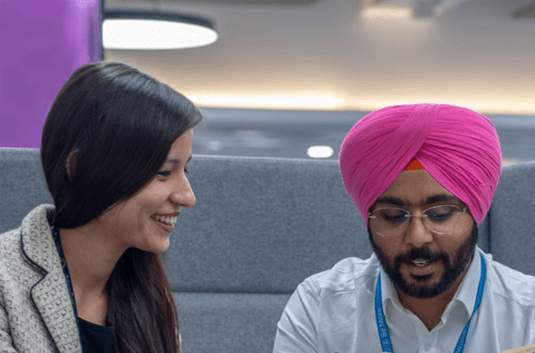Highlights
- Gain exposure to real world problems in our dynamic and invigorating environment
- Collaborate with a team of skilled quant researchers and engineers who are always ready to provide hands-on training, enhancing your abilities through practical experience on significant live projects
- Opportunities to use sophisticated and sustainable quantitative solutions and analytical tools to solve business problems
About the role
Join us, and we’ll encourage you to push the boundaries of what you know. Using the latest technological innovations and smarter ways of working to arrive at optimal solutions.
The best way to get a sense of what it’s like to work with us is to experience it for yourself. Our graduate opportunities give you the chance to do just that – immersing you in our culture, involving you in real projects and giving you a fantastic overview of the business.
Explore our core business areas—each offering unique opportunities to engage, contribute, and grow. Where we have opportunities for multiple business areas in the same location, you’ll be aligned to one of our core business areas during the assessment process.
Risk
As an intern or grad in Risk Quantitative Analytics (Risk QA), you will have an opportunity to join a group of specialised modellers and developers powering Barclay’s ability to measure and manage financial risk. From day one, you’ll be part of a team that uses statistical methods, AI techniques, and coding strategies to build the tools and models Barclays uses to make big decisions. Along the way, you’ll collaborate with colleagues across risk, finance, global markets, and technology - gaining exposure to how different parts of the business come together to navigate market shifts and meet regulatory demands. It’s a chance to turn complex ideas into real-world impact and see how your work helps shape the future of financial decision-making.
Expertise of Risk QA quants
- Research, development and deployment of AI and machine learning models to modernise and automate our core processes
- Specialists in valuation model types and other portfolio modelling techniques to manage traded risk
- Specialists in model types to support lending businesses: credit decision pricing, expected loss (impairment), unexpected loss (credit regulatory capital) and associated forecasting
- Model development for scenario planning, stress testing and impairment, as well as for assessing economic capital, operational and climate risk
- Experts in forecasting model for balance sheet and net revenue, as well as models which support funding and liquidity, and market risk
- Global presence across US, UK, Europe and India
Markets
Markets includes Quants across numerous business lines, with opportunities spanning Markets Quantitative Analytics (Markets QA), eTrading as well asset class trading/structuring/strategy teams.
Markets Quantitative Analytics
The Markets Quantitative Analytics team develops mathematical models, statistical techniques and computational tools by working with diverse teams spanning trading, technology and risk. Leveraging quantitative finance models and AI/ML techniques, the team develops data driven insights, improving decision making and partnering with trading desks to automate strategies, manage risks and deliver franchise benefits.
Expertise of Markets QA quants
- Markets quants partner with trading, sales and structuring to drive revenue, manage risk and optimise capital through our excellence in mathematical modelling, business understanding and computer science
- Research, develop, implement and support quantitative models and analytical tools that are innovative, intuitive and, where possible, automated implementation of those models
- Transform Global Markets with AI and ML by driving innovation and industry standards; empowering trading, sales and clients with AI driven insights, automation and decision making
- Global presence spanning Americas, UK, EMEA, and APAC
eTrading
The Statistical Modelling and Development (SMAD) team provide and manage eTrading algorithms and decision logic across Markets. The team partners with technology, risk, control functions and trading to deliver industry-leading algorithms for automated pricing, risk management and execution across all asset classes. Working at the centre of AI, machine learning and Big Data, we’re helping Barclays to define the future of eTrading.
Expertise of eTrading (SMAD) quants
- Quantitative analysts in SMAD research, develop and manage algorithms and trading tools used in the electronic trading business across Markets.
- SMAD is embedded within trading, and partners with product, sales and technology to deliver on the eTrading goals of the Markets business, both in algorithmic market making and execution
- Apply cutting edge mathematics, AI, statistical and computer science alongside commercial acumen to solve complex problems involving noisy data
- Our approach is data driven, with an emphasis on constant improvement
- Global presence in the US, UK, EMEA, and APAC
Candidate Requirements
- Students in final year or have completed a Bachelors, Masters, PhD or equivalent degree in a technical discipline such as Quantitative Finance, Calculus, Statistics, Economics, Computer Science, Physics, Machine Learning or similar subjects
- Programming skills in any language, but C++, Java or Python is preferable
- Attention to detail, strong analytical skills, and an interest in real world problem solving
- Communication and collaboration – driven to identify the best solution to a problem and then motivated to deliver that solution at pace.
- Curious - ready to develop a deep understanding of what we do, why we do it, and how your role impacts our business outcomes.

Further information














